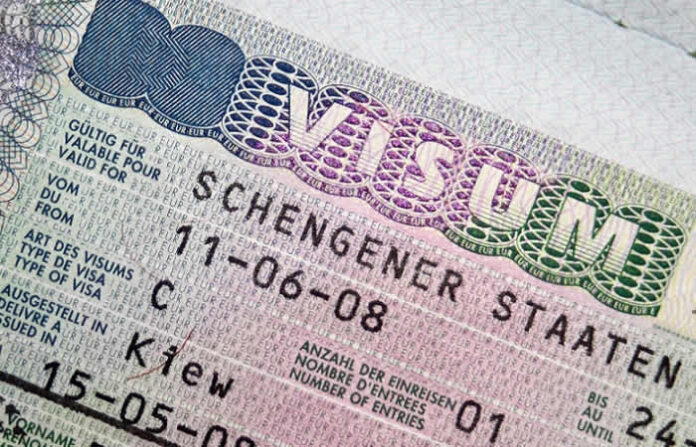89,000 Nigerians denied Schengen visa in two years – Report
CHIGOZIE AMADI
Nearly half of Nigerians seeking to visit Europe’s Schengen Area over the past two years were denied visas, data obtained by The PUNCH shows.
Out of 192,741 visa applications from Nigerians in 2022 and 2023, 89,344 were turned down, translating to a rejection rate of 46.35 per cent.
Official data from the European Commission and the Henley Global Mobility Report indicate that the rejection rate made Nigeria one of the top 20 countries with the most visas denied to their choice destinations. The country ranked 11th on the list.
In 2022, Nigerian passport holders lodged 86,815 Schengen visa applications, with 46,404 denied. The following year, 105,926 Nigerians applied, with 42,940 rejections.
Although the reports suggest a gradual rise in the share of Schengen visas issued to Nigerian travellers over the years, the denial rate has continued to climb.
The Schengen visa is a short-stay permit allowing travellers to move freely across 27 European countries that make up the Schengen Area—an arrangement designed to simplify cross-border travel and promote regional integration.
First introduced in 1995, it eliminates internal border controls among member states, so holders typically undergo passport checks only upon entry to the Schengen zone.
Depending on the type of visa granted, a traveller may stay for up to 90 days within a 180-day period for purposes like tourism, business, or visiting relatives.
Applicants must show proof of sufficient funds, travel insurance, a precise itinerary, and other documents confirming their intent to return home.
While it streamlines travel for many nationals, the permit has proven challenging to secure for individuals from regions with higher perceived overstay risks or security concerns, resulting in relatively high rejection rates for certain nationalities.
Experts say push factors such as harsh economic realities continue to fuel thousands of applications from Nigeria annually as more citizens take the Japa route—a term meaning “escape” often used for emigration.
For instance, the inflation rate in Nigeria increased to 34.80 per cent in December 2024. The rate is expected to be 32.00 per cent by the end of Q1 2025, according to Trading Economics global macro models and analysts’ expectations.
The Nigerian passport fell by 32 places in Henley’s global ranking in the last 20 years, from 62nd in 2006 to 94th in 2025.
According to Henley’s report, six of the top 10 countries with the highest Schengen visa rejection rates are in Africa.
The Comoros led with a 61.3 per cent rejection rate, followed by Guinea-Bissau with 51 per cent, Ghana with 47.5 per cent, Mali with 46.1 per cent, Sudan with 42.3 per cent, and Senegal with 41.2 per cent.
Also, three Asian countries—Pakistan with 49.6 per cent, Syria with 46 per cent and Bangladesh with 43.3 per cent—were on the top list.
Though an EU member and part of Europe’s Schengen area, Greece held the second-highest rejection rate at 56.4 per cent.
While the top 10 African countries in terms of rejection submitted only 2.8 per cent of global Schengen visa applications, they faced a rejection rate of 44.8 per cent as half of the 277,792 applicants from the top 10 countries were denied visas.
On visa trends, Prof. Mehari Maru—a scholar at the School of Transnational Governance and the Migration Policy Centre at the European University Institute, and a visiting professor at Johns Hopkins University School of Advanced International Studies—highlighted the structural challenges facing African applicants.
In the Henley Global Mobility Report released in January 2025, he noted “Applicants from African countries often contend with rigorous documentation requirements and heightened scrutiny.
“There are economic, security, and geopolitical dimensions at play, which collectively push up the rejection rates.”
Maru argued that while Africans are receiving more approvals than in specific previous years, their rejections continue to outpace many other nationalities, especially those from regions like North America or Western Europe.
“Global travel freedom has nearly doubled from 58 visa-free destinations in 2006 to 111 in 2025, but the gap between the most and least mobile nations has reached unprecedented levels.
“Africans face consistently higher rejection rates than their Asian and global peers.
“In 2023, despite submitting half as many applications as those from Asia, African applicants were twice as likely to be rejected, with rates 14 percentage points higher than Asian applicants,” Maru added.
However, the rejections are not unique to West Africa. Northern African countries—such as Algeria, Morocco and Egypt—regularly top the list of Schengen denials, suggesting that applicants from across the African continent experience disproportionately high rejection rates.
Regarding the reason for denials, consulates typically cite incomplete documentation, doubts about return intentions, and previous immigration violations, among others. Last December, Vice President Kashim Shettima revealed that Nigeria returned about 10,000 of its citizens detained for sundry migration offences across Europe and America in 2024 alone.
A former Nigerian Ambassador to Singapore, Ogbole Amedu-Ode, told our correspondent that the inclination to leave the country largely stems from Nigeria’s struggling economy, with many citizens taking the Japa route.
He argued that such trends are likely to persist unless there is a significant improvement in the nation’s economic performance.
“The urge to travel out of the country is in itself, primarily, a function of the performance of our national economy.
“The economic doldrums have pushed compatriots to get into the Japa mode.
“The trend may, unfortunately, increase until there’s a turnaround in the performance of the national economy,” the ex-diplomat noted.
He said while the statistics on the visa application denials are worrisome, there is also evidence of an increase in the number of approved visa applications by Nigerians seeking to travel to Schengen member countries.
Amedu-Ode added, “Even then, the simultaneous increase in approvals and rejection is a function of the spike in the number of our compatriots applying to travel to that zone of the world.”
























